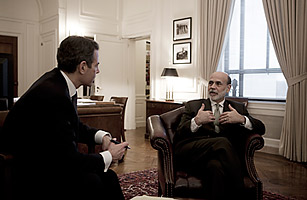
TIME's Managing Editor Richard Stengel talks with Federal Reserve Chairman Ben Bernanke during an interview in Washington, DC
(6 of 12)
We didn't have that. Therefore, nobody paid enough attention to AIG, nobody paid enough to attention to credit and call swaps, nobody paid enough attention to some of the activities of investment banks. You go on, and on, and on. Again, if we had had a more comprehensive overview approach that would have been helpful.
A second key element is the problem too big to fail, and how to address that. So, I just want to be very, very clear that even though the Federal Reserve was involved in rescuing Bear Stearns and AIG, we did that extremely reluctantly, and with — it was a very distasteful thing for us to do. We did not do it — we were not set up to do it. We were — it was very difficult for us to do, but we did it because there was no appropriate mechanism, there was no set of laws that would allow the government to intervene in a situation like that in a way that would allow the firm to fail, but would not have all the negative consequences for the financial system and the economy.
So, we had a situation where there were firms who were literally too big to fail, or too complex to fail, or too interconnected to fail. When they came to the edge of collapsing, we had only two very, very bad choices: we either bailed them out, put taxpayer money at risk, put the Federal Reserve at risk in terms of our lending, or we could let them collapse and have all the hugely negative consequences for the financial system and for the economy.
So, what we did not have, and what we very much need going forward, is a third option, and that option should be a legal framework which allows the government — and I think that means, in practice, the Treasury and Federal Deposit Insurance Corporation — to intervene when a large complex systemically critical firm is about to fail, and to allow the firm to fail, impose losses on the lenders, the creditors of the firm, the shareholders, fire the management, protect the taxpayer, but be able to do that in a way that protects the system, so that the financial system is protected from the immediate impact of that collapse.
We did not have a system like that in place. I think if we had, we could have dealt with Lehman Brothers and AIG in a much more satisfactory way. We would have avoided many of the problems. And, most importantly, we would have not, in some sense, rewarded failure, which is what happened. In the future, it's important that firms be allowed to fail if they, in fact, take excessive risks, and make bad gambles.
But that mechanism is not in place now.
The mechanism is not in place, and we have asked Congress to address it, and I believe that they will. But until they do, we are really still in a situation where we don't have good options in dealing with potential collapse of a global financial firm.
You had said one of the goals when you came to Washington was the management and communication of the monetary policy. This year you've stepped out a little more than the past Fed chairmen. Are you still convinced that being more communicative about the Fed and the things it does is the right approach?
Yes, I am. And we communicate on multiple levels. I mean, first, we provide a lot of detailed information to the Congress about our financial condition, our balance sheet, our financial transactions, our financial operations, our controls. We provide a great deal of information to the public and to the Congress about monetary policy. For example, we provided detailed minutes just three weeks after a meeting to describe the entire discussion and decisions we come to. All those things provide a lot of information, a lot of transparency, but they're mostly for specialists, people who are particularly interested in the Federal Reserve or monetary policy. And they don't, generally, reach the general public very much except through newspaper stories and the like.
And you're right that, in the past, Federal Reserve chairmen have not generally gone directly to the public. But I felt not only was it an issue of understanding what the Fed was doing, but I believed that a lot of the fear and uncertainty that was apparent in the surveys was the result of the fact that people didn't understand what was happening in our economy, or happening to our financial system. And I thought it would be helpful, as the chairman of the Federal Reserve, as much as possible to go out and talk directly to the public, try to explain what we were doing, why were doing it, what was happening in the economy, what was likely to happen in the future. So, I did that, you know, in the context of 60 Minutes, a PBS Town Hall, and also in speeches in places like Morehouse College and the National Press Club and so on. And just, in fact, a couple of days ago, Monday, yesterday I gave a speech called "Frequently Asked Questions," which was intended to address four sort of basic questions that the general public might be interested in.
So, I think that's important, and I think it may have helped some. It's true that the Federal Reserve faces a lot of political pressure, and is unpopular in many circles. The Federal Reserve's job is to do the right thing, to take the long-run interest of the economy to heart, and that sometimes means being unpopular, but we have to do the right thing.